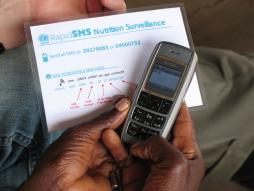Later this month, Souktel, a Palestinian NGO, and UNICEF will host a two-day bootcamp and mobile programming workshop with young Palestinian developers in Ramallah. The bootcamp hopes to jumpstart a mobile open source developer community in the region.
“There are a lot of young Palestinians who are unemployed. […] We wanted to work with young people who have time and are creative. We hope to create the first mobile open source community in the Middle East,” says Souktel’s Katie Highet.
These kinds of mobile bootcamps are not new. We have recently written about the proliferation of mobile bootcamps to nurture the next generation of mobile app developers in Africa. One of the more recent camps happened in Senegal, for example, where Christelle Scharff ran the Mobile Development and Web Design for Senegal project that teaches students to develop mobile applications there.
The Palestinian event may well be a win-win for all; Souktel has long promoted the use of SMS for employment listings and mobile open source platforms, and UNICEF wants to further develop RapidSMS, a mobile data collection platform in the region. Participants gain skills and a community of like-minded individuals. Both organization hope that mobile programming trainings and building a community of open source developers in Palestine will allow organizations and entrepeneurs to develop local-centric tools.
Says Highet, “What will be great about this workshop is that it will really allow us to see where the gaps are. We’re not coming from abroad and thinking about what might be useful here. The beauty of an open source community amongst Palestinians is that they will be able to identify where and what the needs are themselves.”
The workshop has drawn more than 40 applicants, and roughly 20 are expected to attend. The training session includes an introduction to RapidSMS, programming in Django and Python, instruction in writing, testing and debugging applications, and looking at real world examples that show how mobile applications are being used elsewhere. The developers are all graduates of local Palestinian universities with degrees in computer science. According to Highet, the group of expected attendees is comprised of 2/3 male developers and 1/3 female developers.
According to Highet, 90% of Palestinian families have mobile phones and the unit cost of a cell phone is fairly inexpensive in comparison to other technologies. Mobile phones are especially effective tools in the region since checkpoints often block physical movement across borders and Internet access is spotty. Mobile phones, in contrast, offer a reliable way to communicate. Says Highet, “It’s using what already exists. We have plenty of restrictions here in the West Bank, and the mobile is an easy way for everyone communicate.”
Training and opportunities for individuals in a given community to use mobile technology to solve problems in that community is often regarded as the best way to develop long-term and sustainable solutions. More events that draw on local talent and encourage future development are needed in order to create a thriving open source community, and we’re excited to see that Souktel and UNICEF are working together to meet this need.
| Building a Mobile Open Source Community in Palestine data sheet 3906 Views | |
|---|---|
| Countries: | Palestine |


SMS / Palestine / West Bank / Gaza
Great story! And an absolutely fertile land for huge benefits from SMS! As I was reading this, I also thought: Ushahidi - you could extend/connect Ushahidi as a platform for SMS and a real benefit for everyone living and trying to travel in the West Bank. With all the checkpoint, flying checkpoints, sudden road closures, something like Ushahidi combined with support within the West Bank could prove to be quite valuable -- again, for *everyone* traveling inside the West Bank. (based on my personal experience in 2004 and again in 2009)
Post new comment